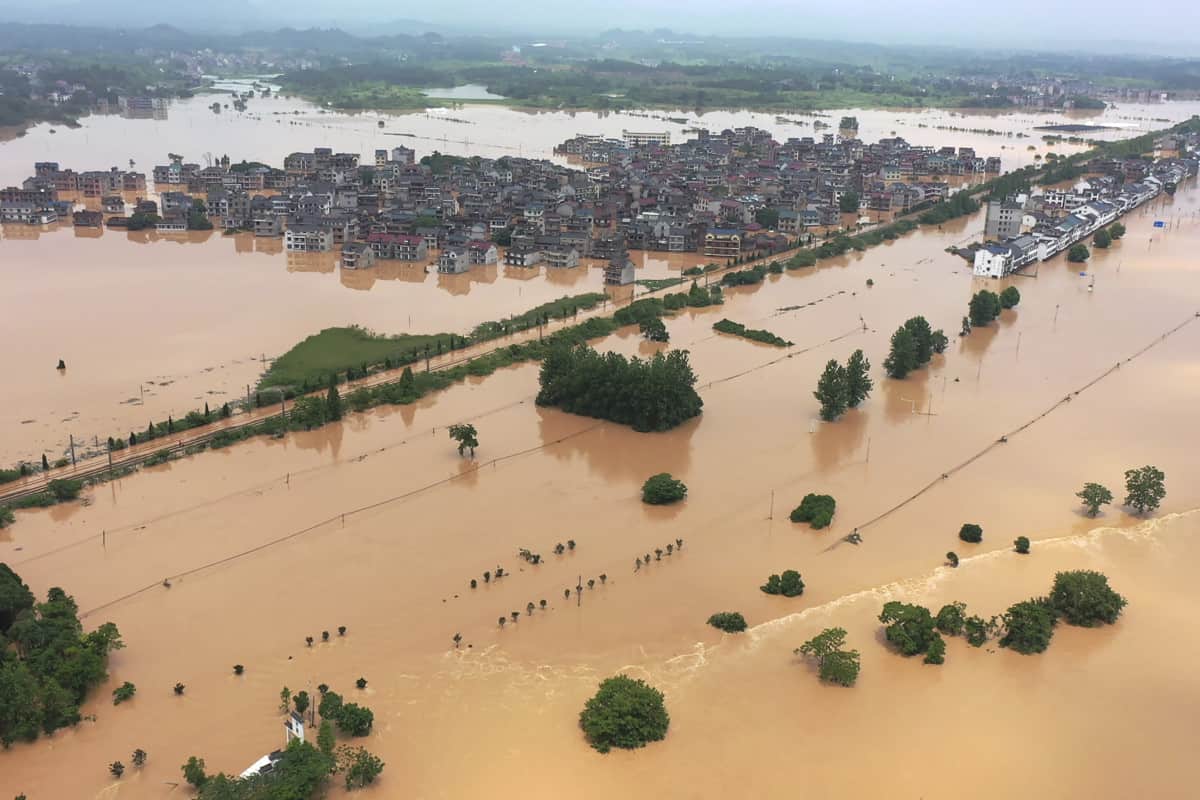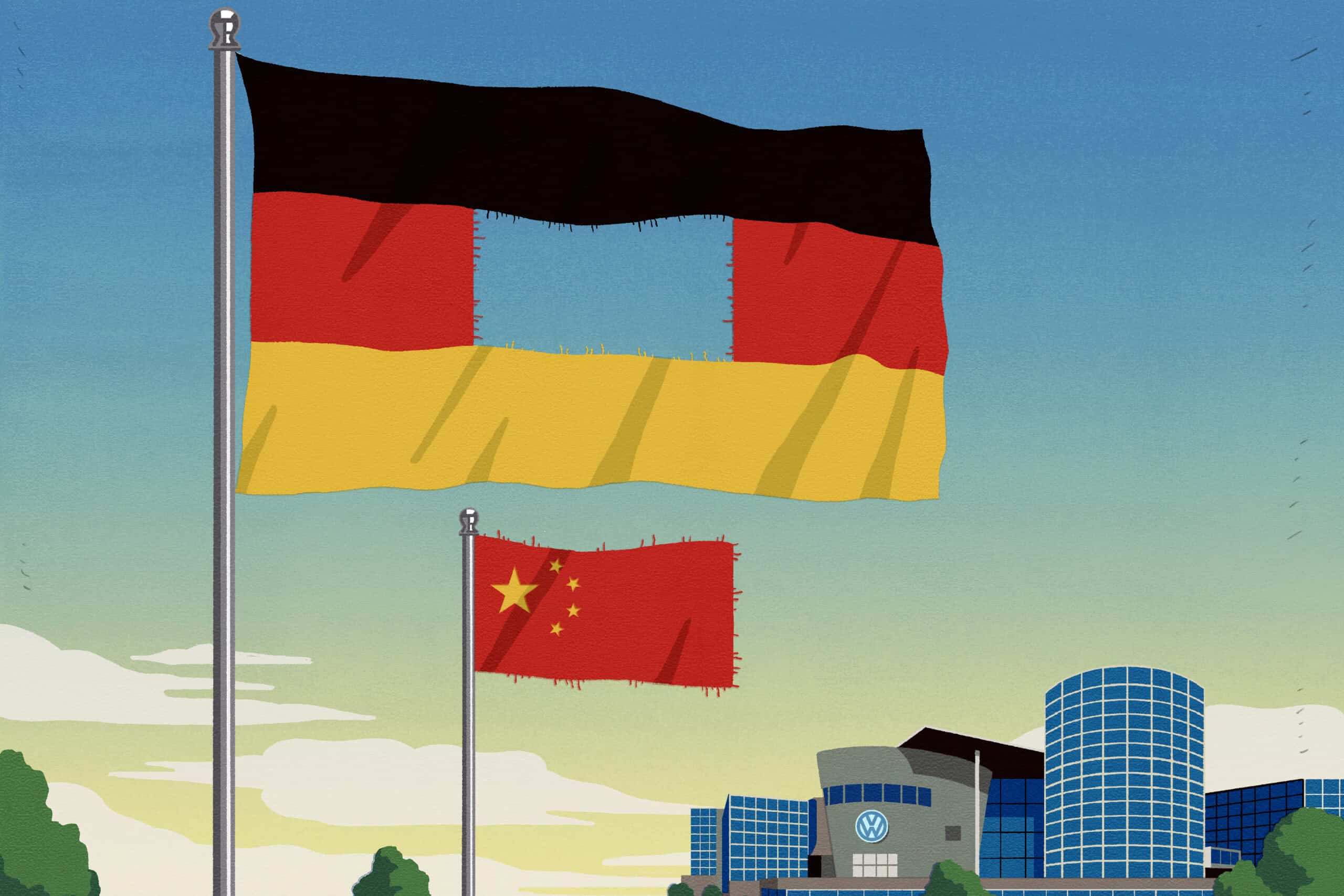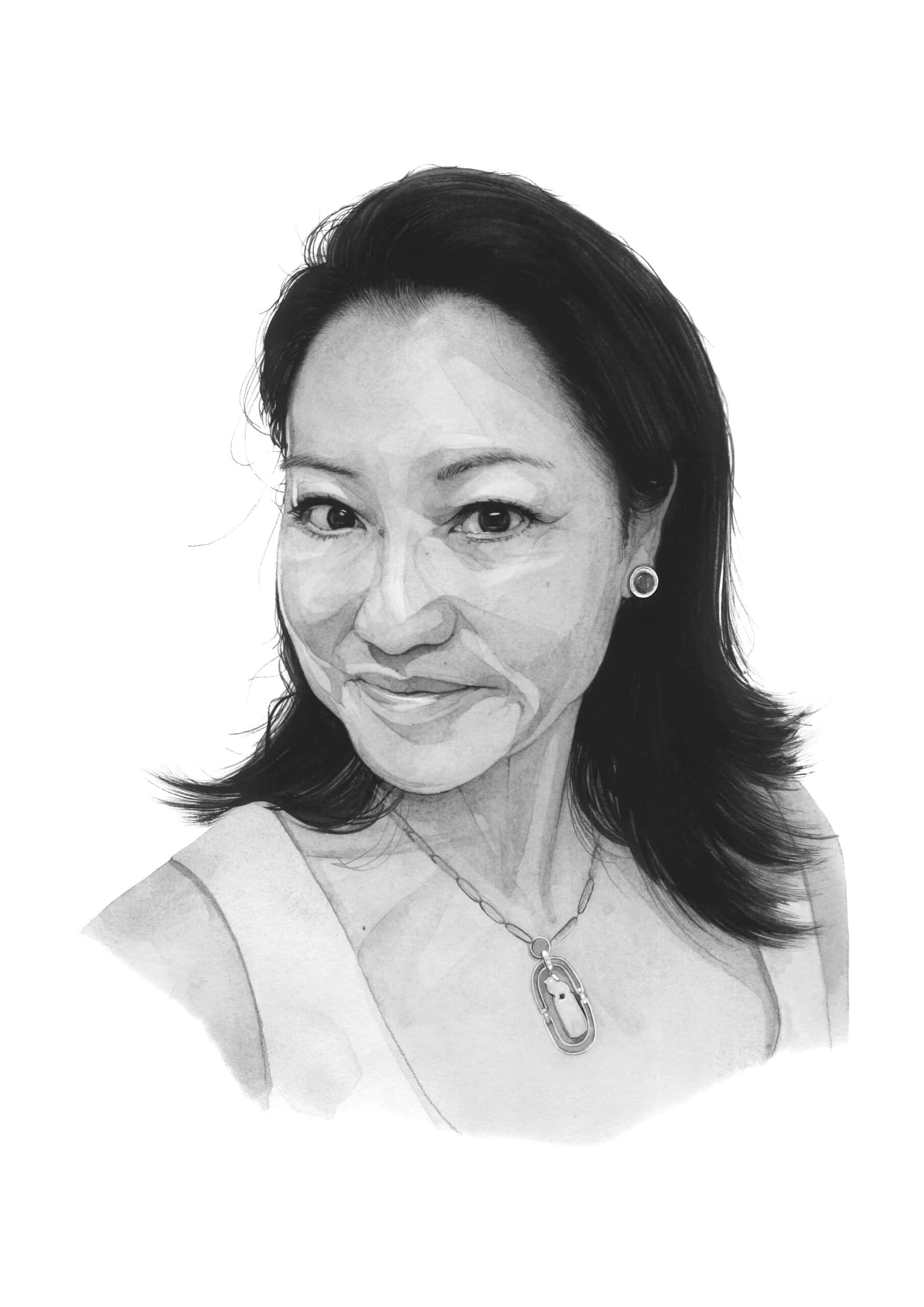Sara Castro is an Associate Professor of History at the United States Air Force Academy and the author of Mission to Mao: US Intelligence and the Chinese Communists in World War II. The book chronicles the origins and fate of the first official contact between the U.S. government and the Chinese Communist Party: the so-called “Dixie Mission” to Yan’an by a small group of American military personnel, diplomats, and intelligence officers. Earlier in her career, Castro worked as an intelligence analyst at the CIA, focusing on East Asia.

Illustration by Kate Copeland
Q: There are certain elements of the U.S.-China partnership during World War II that the Chinese government still lauds, like the Flying Tigers. Where does the Dixie Mission fit into that history and how is it perceived today?
A: The Dixie Mission is still a very popular subject in the PRC. It’s remembered fondly, as a story of alliance during war that the CCP has highlighted over the years, especially on anniversaries. Several times over the years, the Party has invited the original Dixie Mission members and their families to celebrations in Yan’an and Beijing. Such nostalgic events occurred as recently as 2004, for the 60th anniversary of the start of the mission. The CCP recognized the mission as the start of its engagement with the United States. It is definitely one of the times the CCP historians remember positively.
Why hasn’t it been studied more?
Historians in the West studied the Dixie Mission quite a bit in the twentieth century, but they were asking different questions than I do in my book. Early impressions of the Dixie Mission were complicated on the American side because of anti-communist sentiment and the Red Scare, which happened shortly after the Dixie Mission ended.

Historians from the 1950s to the 1990s took two different approaches to explaining the impact of the Dixie Mission on relations. The first view, during McCarthyism, held that if it had done a better job, the United States wouldn’t have “lost” China. Most of the Dixie Mission documents were declassified at that point because the question of what happened during the mission was so politicized: Policymakers were asking “How did China go to the communists? We had people there. How did they screw up?”
The second wave was when more documents were declassified in the 1970s, when people were questioning the U.S. government’s role in Vietnam and World War Two. Historians at this point argued that the United States lost its chance to engage with the CCP during the Dixie Mission. Revisionist historians called it the “lost chance” argument — that the U.S. had a chance to engage the communists as partners and steer them and blew it.
| BIO AT A GLANCE | |
|---|---|
| AGE | 47 |
| BIRTHPLACE | Arizona, USA |
| CURRENT POSITION | Associate Professor of History, US Air Force Academy, Colorado Springs, Colorado |
When Chinese documents started to be available to Western scholars during the 1990s and the perspective of historians started to be more global, scholars recognized China’s agency. China’s political outcomes are the result of its own people and parties deciding a future, and not for the United States or any other foreign power to win or lose. My book uses that as a starting point, where China has agency to work with the U.S. or not.
Getting back to your question of why don’t Americans know more about the Dixie Mission or see it heroically, the role of Joseph Stilwell is controversial. There’s myth making about what he was doing, and some of that transferred to myths about Chiang Kai-shek, the leader of the KMT and the internationally recognized leader of China up until the PRC’s founding in 1949. Once documents about Chiang were released, it turns out those myths don’t hold water. As academic historians have started to use Chiang Kai-shek’s own diaries and pair them with other Chinese records, myths that developed about Stilwell’s actions have been debunked or called into question.

This is the argument between Barbara Tuchman’s version of Stilwell-as-hero in Stilwell and the American Experience in China, against the more recent historians who think he had a poor understanding of modern infantry tactics and didn’t actually know what he was doing advising Chiang.
That’s right. Stilwell represented a particular kind of American paternalism that existed in China. In the book I reference Michael H. Hunt’s important work, The Making of a Special Relationship: The United States and China to 1914. I talk about Hunt’s idea of open-door paternalism, that America is in China to help China whether China wants it or not. Hunt argues that Americans have this view of the world, with the emphasis on human rights and liberty, that they feel is so profound and correct that everyone should and would want to govern from it. Americans are there in China to spread that light to everyone, in a way that they think wasn’t like the British were doing.
Stilwell is a figure that held those ideas and so did the cohort who served him. When he found that his efforts weren’t penetrating Chiang Kai-shek’s government, he thought maybe we’ll have more success with the Communists. That’s why Dixie started. They were exploring another opportunity for engagement to have more traction with China. And it didn’t work, spoiler alert!
What did the Americans who went on the Dixie Mission expect to find?

They had read Edgar Snow, the journalist famous for his glowing view of the CCP in Red Star Over China. [Then president] Franklin D. Roosevelt had had one contact that was a Marine who had passed through Yan’an and sent him letters about the Communists. But not much more was known. There were some journalists passing through who gave reports. They definitely had this idea that the Communist history in China was an underdog story. It was a group of guerrillas fighting the good fight, using their will and intellect and almost no resources to fight the Japanese enemy. It was a very romanticized vision they went in with, which it seems that Mao just ran with.
Yan’an was very remote. Roads going there were impassable much of the year. The mission only happened because of American air power. It happened in a small way because Stilwell was an Army general, and he was fighting with Chennault, the leader of the famous “Flying Tigers” and the Chinese Nationalist Air Force, who controlled the airplanes — these men were rivals. Dixie didn’t have a lot of access to airpower but it’s the only real way to get to Yan’an at the time other than mule trains. Planes are appealing to the Communists, too, the idea of quicker access to supplies and the legitimacy of American recognition domestically. That clearly appeals to them at the beginning.
…if the communists were coming to this engagement with any kind of romanticism about U.S. ideals, and any hope for engagement and support, hope for legitimacy — what the Americans end up doing does not reinforce those ideals.
What did the Chinese expect?
It’s hard to tell with confidence because we don’t have a lot of the documents. My project focuses almost entirely on the Americans for that reason. We can see the Chinese through American eyes but understanding the CCP leaders’ intentions and thinking is really a difficult piece of it.

What do the Americans find, and what’s the response back home?
The highest-ranking American to stay in Yan’an is a colonel; everyone else was lower ranking or civilian. They’re from all different organizations — OSS, the CIA’s forerunner, and Army and the Office of Naval Intelligence — almost everyone is represented. They find it’s very hard, and things that have become the norm in other parts of the war don’t work in Yan’an. It’s just hard to do intelligence there. There are multiple players who haven’t agreed on the lanes in the road at all. There’s rivalry, repetition, and chaos. Being a part of an interagency mission in an extremely remote area, they run into all sorts of problems. You don’t see them fighting with each other very much, but they are definitely having to fight to represent their agency’s own interests, so that’s counterproductive.
So it’s mostly a story of Americans getting in their own way in Yan’an. Not a lot of good intelligence ever comes out of there. Some of what the army found useful was weather reporting and reporting on the leaders themselves. Those reports are still fascinating — Americans’ first official impressions of Mao Zedong and Zhu De and other early leaders. The other thing they found that was useful was they were able to collect Japanese press and Japanese captured materials and reports on troops movements and capabilities from behind the lines.

It all ends in March 1947: by that time it’s a skeleton crew, two or three guys and a plane. They take off from the airstrip and the captain who was there, the last official running this mission, looks back and the communists have blown up the airstrip as soon as he’s airborne. They don’t want the Nationalists to see it or land there. The Americans are looking back toward Yan’an, and it’s just clouds of dust.
What did the CCP take away from this first engagement with the U.S.?
The documents on this just aren’t available to scholars right now, if they were even created. I do think I can trace a thread, that if the communists were coming to this engagement with any kind of romanticism about U.S. ideals, and any hope for engagement and support, hope for legitimacy — what the Americans end up doing does not reinforce those ideals. We don’t know with confidence if they had that romanticism, maybe they were very realistic, but they felt it was a good sign that Americans were coming, and they could be friendly and cooperate against the Japanese. They do ask for military support and weapons and at one point they work with the Americans to plan a covert operation in eastern China to prepare a base area in case the Americans need an amphibious attack on Japan. They make initial plans for the space and offer to work on the operation. But U.S. headquarters finds out and objects.

So if the CCP had hoped for engagement, it doesn’t pan out. The U.S. ends up looking like one side doesn’t know what the other side is doing because of this ad hoc expansion of U.S. intelligence.
Do you think that first experience feeds into the CCP’s shift toward anti-Americanism in the years around the founding of the PRC?
That question is bigger than the role and actions of any of the Americans that were in China. Mao and Zhou Enlai’s one-on-one engagements with the Americans, those were positive experiences for both sides.
The shift is more of a geopolitical change that everyone was enduring. The war ends, Stalin goes off in his violent direction, the Korean War [1950-3] happens. China has its own interests domestically and internationally in Korea. The other game changer is nuclear weapons. Mao determines the atomic bomb is essential and all deterrence depends on having it. That becomes a big influence on the bilateral relationship: the nuclear age and the Cold War.

None of that necessarily has to do with American diplomats and the personal experiences that Mao and Zhu and Zhou had meeting Americans. They all said they liked meeting Americans. The Dixie mission used to fly in American movies, and Mao loved to watch Laurel and Hardy and Marlene Dietrich. The CCP leaders liked American things, and they had a good attitude about America, but there’s this security and geopolitical piece they can’t accommodate.
What I wonder about is in 1971-1972, when Mao and Zhou meet Americans again [during President Nixon’s historic visit to China]. They are the same leaders who met the Dixie Mission members now meeting different Americans coming at relations from a different angle. But they have those memories from earlier on — what’s in their minds?
How did the Americans who took part in the Dixie Mission reflect on their experience?

This event profoundly altered their life trajectory, at least for those who were first into Yan’an. A lot of them were people who meticulously saved materials from their experiences. There are letters between them from the 1970s and 1980s, when government records of Dixie are declassified and historians are starting to work on the issue. They’re still in touch, corresponding about their memories and checking details of books that have come out. The cohesion between them was deep.
Even in the 1970s some of them appeared at congressional hearings on U.S.-China relations, reflecting on it. Toward the end of their lives some of them started to realize maybe the U.S. had a problem with paternalism, and maybe paternalism had gotten in the way during Dixie. That fascinates me, because it’s very easy for paternalism to be unconscious, especially for Americans, who often have so much confidence and belief in this idea of the exceptionalism of the nation. In foreign relations it’s so easy for paternalism to be a thing foreign partners recognize right away. It’s exciting to be a historian because when you go back to the 1940s the paternalism is really obvious, even to those who were there. I think we can learn something from that, from looking at these really obvious cases, how those same ideas could be affecting us today and messing things up.

You’re a professor of history at the U.S. Air Force Academy, teaching the next generation of warfighters. For many of them, China must be top of mind, but they might not know a lot about it coming in as freshmen. What do you try to teach them and what do you hope they take away from your courses?
When I talk to cadets about China, I encourage them to think about nuance, about China as a diverse place, with a government that is communist but where the majority of people aren’t part of that party. There’s a separation between people and politics that they should understand exists. There’s a lot of foreign posturing and signaling that might in fact inflate Chinese capabilities; and that there are historical consistencies as well as disruptions and those affect what China is going to do and its leadership’s intentions.
[Xi Jinping] may not engage in consensus or negotiations; changing his mind may have a drastic impact on the intentions of the Politburo Standing Committee. That makes understanding harder than it’s been in a long time.
It is important for cadets to understand that domestic issues are important in China just as they are in the United States. A lot of our conversation on this side of the Pacific is focused on this foreign engagement piece. Leaders there, as here, are more focused on domestic audiences. Reminding my students that there are domestic interests there and they’re not necessarily the same as the foreign ones we think about — I try to get them to think about that.
You started your career as an East Asia analyst at the CIA. How does that experience inform your teaching and historical work today?
It’s really important to be clear in your mind about what you can know confidently and what you can’t. I’m asked a lot of questions about China’s ability and intentions. It’s much easier to answer questions about capabilities than intentions. Understanding leadership intentions has to do with media and documents and Chinese culture and the way they broadcast intentions or don’t. Being an analyst really taught me the importance of being clear in your own mind where your information is coming from, the quality of it, and what kind of confidence that can give you in an assessment. What new information could change your assessment or what could shift your understanding? Those are basic tools of analysis that are incredibly important on China.
This is more true than ever during the Xi regime. He may not engage in consensus or negotiations; changing his mind may have a drastic impact on the intentions of the Politburo Standing Committee. That makes understanding harder than it’s been in a long time. The other side in understanding what’s important is to understand China’s domestic issues. How much going on domestically affects what the leader’s interests are and what they do, domestically and abroad.
| MISCELLANEA | |
|---|---|
| FAVORITE BOOK GENRES | Military history and intelligence history, spy novels |
| FAVORITE FILMS | Dr. Strangelove or: How I Learned to Stop Worrying and Love the Bomb, Coen brothers films, especially Burn After Reading |
| FAVORITE MUSIC | Miles Davis, Yo-Yo Ma, ‘90s grunge rock |
| MOST ADMIRED | Maya Angelou, Siddhartha Gautama |
This is a tough question for anyone, especially a historian, but looking at the long sweep of U.S.-CCP engagement from the Dixie mission to today, where do you think we sit in the sweep of history? What’s coming next?
This question makes me think of the demographic issues that are happening. If we’re looking over the next 100 years, those demographic issues are significant. You have to imagine that’s on the mind of current leaders, making them wonder whether they should do something now or later. I’m talking about reports that the total population could be shrinking to 600 million people in the next 100 years. Climate change is also affecting China deeply.
Getting back to the domestic issues that are so important: One thing you notice if you go to China, is there’s so many people there, and there have been so many people there for so many hundreds of years, all the land is taken up and resources are spoken for. So if something happens with climate that causes a shift, it’s proportionally more of a shift than in places with a less entrenched civilization. Those are two indicators I have my eye on in terms of where we’re headed, and those are destabilizing indicators that could make leaders act in a certain way that isn’t necessarily security enhancing.


Left: Floodwaters around a town in Jiangxi province, June 21, 2022. Right: People walking on the exposed banks of the Yangtze River basin in Wuhan, September 2, 2022. Credit: Chinatopix, Sipa via AP Images
I get asked a lot about regime change. Could it happen? Could we bring it about? Look at what regime change in China looks like in the past. It’s chaos! For China and the rest of the world. For a long time after. It’s not something people in the U.S. or China or anywhere in the world should hope for. No matter what we think of the CCP or what they’re doing, gradual transition will be better, just because of the historical continuities that have existed in that place. That’s another place where the historical view can give us a valuable perspective as everyone looks at the present situation with a side eye. Things may look bad, but maybe not as bad as the chaos of regime collapse.
The views expressed are those of the interviewee and do not reflect the official policy or position of the Central Intelligence Agency, the Department of Defense, the U.S. Government, U.S. Air Force Academy, or U.S. Air Force.

Alex W. Palmer is a writer based in Washington, D.C. His work has appeared in The New York Times Magazine, GQ, WIRED, and other publications.




